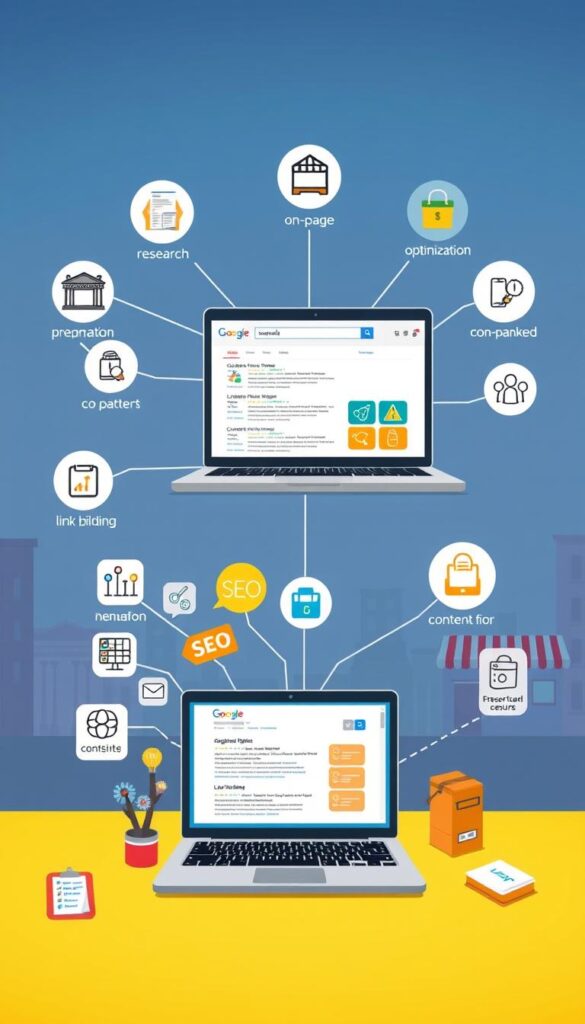
In today’s digital world, having an online presence is key for small businesses to grow. Most have a website, but knowing how to use it to get more leads is crucial.
We know that more targeted online traffic means more leads. That’s where our SEO strategies come in. By making your website search engine friendly, we boost your online visibility. This drives more potential customers to your site.
Effective SEO is not just about being seen; it’s about being seen by the right people. Our strategies help your small business stand out online. You won’t just be another website; you’ll be a top choice for your target audience.
Key Takeaways
- Having an online presence is crucial for small businesses.
- Targeted online traffic can generate more leads.
- Our SEO strategies can boost your online visibility.
- Effective SEO helps you compete in the digital landscape.
- Being seen by the right people is key to online success.
Understanding SEO and Its Importance for Small Businesses
In today’s digital world, knowing about SEO is key for small businesses to do well online. It’s important to understand the basics of SEO and how it affects your online presence.
SEO, or Search Engine Optimization, helps search engines understand your content. It also helps users find what they’re looking for online. It’s a strategy that uses many techniques to make your website more visible in search results.
What is SEO?
At its heart, SEO is about making your content relevant and visible. It makes your website search engine-friendly, so it shows up in search results. This means knowing how search engines work and what people search for.
Good SEO is not just for search engines. It also makes your site better for users. This includes making it easier to use, faster to load, and having high-quality content that matters to your audience.
Why SEO Matters for Small Businesses
For small businesses, SEO is a big deal. It lets you compete with bigger companies by focusing on specific audiences and areas. By optimizing your site for search engines, you can get more people to visit your site. This can lead to more sales and growth.
Here are some key reasons why SEO matters for small businesses:
| Benefit | Description | Impact |
|---|---|---|
| Increased Visibility | Higher rankings in search engine results | More eyes on your business |
| Targeted Traffic | Attracting users searching for your products/services | Higher conversion rates |
| Competitive Advantage | Competing with larger businesses through targeted SEO | Leveling the playing field |
By understanding and using SEO, small businesses can see big benefits. These include more online visibility and better customer interaction. As we dive deeper into SEO, it’s clear it’s a must-have for any business wanting to thrive online.
Key SEO Components for Effective Marketing
To market your small business online well, knowing SEO is key. A good SEO plan can really help your website get more visitors and leads. By focusing on the main parts of SEO, small businesses can get seen more online and reach their audience better.
On-Page SEO Essentials
On-page SEO makes your web pages better for search engines. It’s about using the right keywords, optimizing meta tags, and creating great content. Keyword research is vital, as it finds the search terms your customers use.

Off-Page SEO Importance
Off-page SEO is about actions outside your site to improve its ranking. It’s mainly about getting good backlinks from other trusted sites. This boosts your site’s credibility. Guest blogging and social media engagement are great for off-page SEO.
Technical SEO Basics
Technical SEO makes your website better for search engines. It’s about speeding up your site, making it mobile-friendly, and improving its structure. A fast and secure website is good for users and search engines.
By knowing and using these SEO parts, small businesses can make a strong SEO plan. This plan can bring more traffic, leads, and sales.
Researching Keywords that Drive Traffic
Keyword research is key for small businesses to succeed online. It’s about finding the words people use to find what you offer. By using these keywords, you can make your site more visible on search engines.
A top SEO expert says,
“The key to successful keyword research is understanding your audience’s search behavior and preferences.”
This shows how crucial it is to match your keywords with what your audience wants.
Tools for Keyword Research
Many tools can help with keyword research. Google Keyword Planner, Ahrefs, SEMrush, and Moz Keyword Explorer are some of the best. They give insights into how often people search for certain words and who else is using them.
Google Keyword Planner helps find keywords related to your business. Ahrefs and SEMrush offer deeper analysis, including what your competitors are doing.

⭐️ Tap the exclusive deal link https://temu.to/k/uot8tcxvwum to score top-quality items at ultra-low prices. 🛍️ These unbeatable deals are only available here. Shop now and save big! ⭐️ Directly get exclusive deal in Temu app here: https://app.temu.com/m/mhb5rstagbx
Another surprise for you! Click https://temu.to/k/uag0bn0o0wd to earn with me together🤝!
Long-Tail Keywords vs. Short-Tail Keywords
It’s important to know the difference between long-tail and short-tail keywords. Short-tail keywords are short and general (like “SEO services”). Long-tail keywords are longer and more specific (like “best SEO services for small businesses in the US”).
Long-tail keywords are less competitive and more focused on what you offer. For example, a small business in New York might do better with “SEO services for small businesses in New York” than just “SEO services.” This way, you attract more relevant traffic.
When we talk about local SEO for small businesses, using location-based keywords is a big help. Keywords that include your city or area can bring in local customers who are more likely to buy from you.
To start, pick 10 to 20 primary keywords that fit your business. Listen to what your customers say and use their words in your strategy. Mixing short-tail and long-tail keywords can attract a wide range of people while still targeting specific groups.
Creating Compelling Content for SEO
Compelling content is key to good SEO. It helps small businesses draw in and keep the right audience. In SEO, content is not just important; it’s essential for your small business website SEO success.
Creating a strong content strategy starts with understanding the value of quality content. Quality content does more than just fill pages with keywords. It offers value to readers and tells a story that connects with your audience.
Importance of High-Quality Content
Quality content is vital for several reasons. It makes your brand a trusted name in your field. It also helps your site show up better in search results, as algorithms look for valuable and consistent content. Plus, it encourages people to share and link to your content, boosting your SEO consultant for small businesses work.
To make quality content, aim for well-researched, engaging, and informative pieces. Use a friendly tone that welcomes a wide range of readers.
Content Formats That Work
There are many content formats to choose from, each appealing to different people. Some top formats include:
- Blog posts: Great for sharing news, tips, and insights in your field.
- Videos: Shareable and engaging, videos can show off products or services.
- Infographics: Visual data or information that people love to share.
- Podcasts: Audio content perfect for on-the-go listening, like interviews or discussions.
Try out different formats to see what your audience likes best.
How to Optimize Existing Content
Improving your existing content is a big step in boosting your SEO. First, find your most valuable pages and check their SEO status. Then, update your content with the right keywords, meta descriptions, and optimize images. Make sure your content works well on mobile devices and loads fast, as these are important for search rankings.
Here’s a simple guide to help you optimize your content:
| Content Element | Optimization Tip |
|---|---|
| Title Tags | Include primary keyword, keep it concise |
| Meta Descriptions | Compelling summary, include primary keyword |
| Headings | Use H1, H2, H3 tags, include keywords where relevant |
| Images | Use alt tags with descriptive text, include target keywords |
By following these tips, you can make your existing content more SEO-friendly.

Creating a content plan that focuses on your best pages and outlines new content is key. Always aim for a realistic plan that matches your business goals.
Leveraging Local SEO for Greater Reach
Reaching local customers needs a smart plan, and local SEO for small businesses is key. As a small business owner, you know how vital it is to be seen by your local crowd. Local SEO makes your business pop up in search results when people nearby are looking for what you offer.

What is Local SEO?
Local SEO is a way to get your local business seen more in search results. It makes your website and online presence match what local customers are searching for. For example, using location-based keywords can really boost your local marketing. Instead of just “outdoor electrical services,” aim for “outdoor electrical services landscape lighting Greenville SC.”
Optimizing Google My Business
One top way to boost your local SEO is by optimizing your Google My Business listing. This means claiming your listing, keeping info current, and getting customers to leave reviews. A good Google My Business listing can make you more visible in local searches and on Google Maps.
To get the most out of your Google My Business listing, make sure your business details are the same everywhere online. Add great photos of your business, and answer customer reviews quickly. This improves your local SEO and builds trust with your local customers.
Building Quality Backlinks
Quality backlinks are key to a good SEO strategy. They help make your website a trusted name in your field. For small businesses, a strong backlink profile can mean the difference between being seen online and being invisible.
Backlinks are links from other sites to yours. Search engines see them as a vote of confidence. They show that your content is valuable and trustworthy. The quality of these links is more important than how many you have.
Why Backlinks Matter
Backlinks are important because they affect how visible and ranked your website is. Here’s why:
- Increased Authority: Links from respected sites boost your website’s authority. This can help you rank higher in search results.
- Improved Visibility: Links from other sites can send more people to your site. This increases your online visibility.
- Better Ranking: Search engines like Google see backlinks as a sign of your site’s credibility. This can help your ranking for relevant searches.

Strategies for Earning Backlinks
To get high-quality backlinks, you need a plan. Here are some good strategies:
- Create High-Quality, Relevant Content: Make content that’s informative, engaging, and relevant. This can attract backlinks naturally.
- Guest Blogging: Write guest posts for other sites in your niche. This can earn you backlinks.
- Leverage Online Directories: List your business in trusted online directories. This can give you valuable backlinks.
- Build Relationships: Network with other businesses and influencers in your field. This can lead to backlink opportunities.
By using these strategies and understanding the value of quality backlinks, small businesses can boost their SEO. This can improve their online presence and drive more traffic to their site.
Analyzing and Measuring SEO Success
SEO’s true value is in its measurable impact on our business visibility. By using affordable SEO for small businesses strategies, we must analyze and measure success. This helps us see what works and what needs improvement.
Key Metrics to Track
To measure SEO success, we track several key metrics. These include:
- Impressions: The number of times our website appears in search engine results.
- Clicks: The number of times users click on our website from search engine results.
- Click-Through Rate (CTR): The percentage of users who click on our website after seeing it in search results.
- Conversion Rate: The percentage of users who complete a desired action on our website.
By watching these metrics, we understand how our SEO strategies are doing. This helps us make smart decisions to improve our efforts.
Tools for SEO Analytics
Many tools help us analyze and measure SEO success. One top tool is Google Analytics. It gives us detailed insights into our website’s traffic, engagement, and conversion metrics.

Google Analytics lets us track our SEO strategy’s performance. We can see if our pages show up in search, how many impressions and clicks we get, and more. This data is key for fine-tuning our best SEO services for small businesses to get better results.
Keeping Up with SEO Trends
To stay ahead, small businesses need to keep up with the latest SEO trends. They must adjust their seo strategies for small businesses to match.
It’s important to stay updated with SEO trends to stay visible online. We use resources like Google Search on LinkedIn for the latest news. This helps us make our site more discoverable, a key part of small business online marketing.
Latest SEO Trends to Watch
Some key trends include the rise of voice search and the use of artificial intelligence in search algorithms. High-quality content is also more important than ever.
| Trend | Description | Impact |
|---|---|---|
| Voice Search | Optimizing for voice queries | Higher rankings for conversational content |
| AI in Search | Using AI for better search results | More accurate and relevant search outcomes |
| High-Quality Content | Creating valuable and engaging content | Improved user experience and search rankings |
Adapting Our Strategies
We focus on making our content both informative and engaging. We also make sure it’s easy to access. This includes optimizing for voice search and making our sites mobile-friendly.

Overcoming Common SEO Challenges
Small businesses often face unique challenges when implementing SEO strategies. Two of the most significant hurdles are budget constraints and time limitations. Understanding these challenges is crucial to developing effective solutions.
Managing Budget Constraints
Hiring an SEO consultant or firm can be costly. We recommend conducting a cost-benefit analysis. This helps decide whether to do SEO in-house or hire a professional.
For example, hiring an seo consultant for small businesses can provide valuable expertise. But it may also strain your budget.
Addressing Time Limitations
Implementing SEO strategies requires significant time and effort. To overcome time limitations, small businesses can prioritize tasks. They can focus on high-impact activities and leverage tools to streamline processes.
By optimizing your small business website seo, you can improve your online presence. This drives more traffic to your site.
By understanding these challenges and developing strategies to overcome them, small businesses can successfully implement SEO strategies. They can achieve their online marketing goals.



